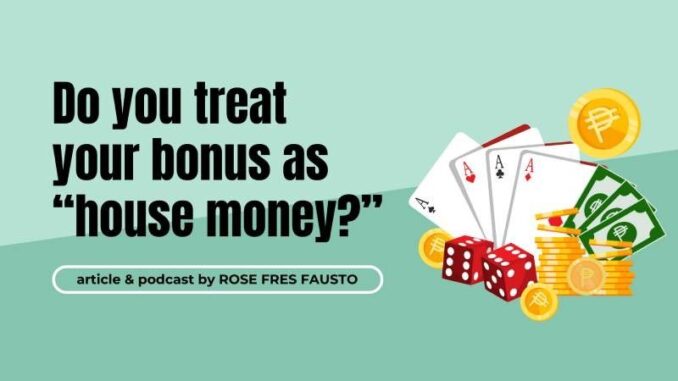
Have you received your Christmas bonus? Where is it now? How did you make use of it? Are you treating it as “house money?”
What is house money effect?
House money refers to money gained unexpectedly, often from winnings, profits, or windfalls, and not from regular income. The term originates from gambling—a gambler’s winnings are perceived to be received from the casino (the house). Imagine winning Php 10,000 in a casino. Most likely, you migh say, “Yey! I won P10,000, I’m going all in for the next round. It’s not my money anyway!”
In Behavioral Finance, the house money effect is explained as our tendency to treat cashflow that comes once in a blue moon differently from that which we receive on a more regular basis. It is perceived as a windfall and is spent more freely and less prudently as compared to our regular income. Like the gambler in the casino, we usually act as if that money was not supposed to be with us anyway, so it easily finds its way out—i.e., we spend it right away.
The behavioral bias that talks about this is mental accounting, as discussed in Chapter 14 of “FQ Book 2 Why Financial Education Does Not Work, back-to-back with The Psychology of Money.“ It is our tendency to categorize money differently, depending on where it came from (source) and where it is going (usage). These are subjective criteria that have nothing to do with utility, and disregard that money is actually fungible.
When it comes to Christmas bonuses, people tend to spend the money less prudently, forgetting to set aside anything for saving and investing. And the reason given is that there are really more expenses during this season and it’s just right to spend that bonus 100%. While it is true that our expenses jack up during the season, not setting aside anything for saving and investing from our Christmas bonus rubs us of the chance to accelerate our saving to maximize the power of compounding on our investments. At the very least, set aside a percentage equivalent to your minimum savings rate that you apply on your regular income; ideally, it should be a lot more.
Let’s bring back the Christmas Clubs
Christmas clubs were special savings programs offered by banks, credit unions, and some employers to help individuals save money for holiday expenses. They had low minimum deposits making it accessible to a wide range of income levels. The total balance was paid out late November or early December to coincide with Christmas shopping.
In the Philippines, there was a similar savings account that was offered by Green Bank, as discussed in “FQ Book 3 High FQ by Design (Shape your environment for a financially healthy you)” in Chapter 9.5. It was called SEED (Save, Earn, Enjoy Deposits). It was a commitment savings device account that required the depositors to restrict their right to withdraw any funds from their accounts until they reached a self-specified and documented goal. This was under the experimental guidance of a team from Harvard and Princeton in 2004. With the use of rigorous experimental methods, the team concluded that the commitment savings product design was successful in raising total savings for both the depositors and Green Bank. It also observed that the cost of offering the product was minimal to the bank with benefits outweighing the costs. Unfortunately, upon checking with the original owners and the new management of Green Bank, I gathered that they discontinued the product. (To find more about this, read Chapter 9.3 of FQ Book 3.
In the US, the Christmas Clubs also declined in popularity with the rise of credit cards and other flexible loans. So, these days, we’re doing the opposite of sound financial behavior. Instead of save first then spend later, it’s buy now, pay later!
My wish is that banks would offer these effective commitment savings accounts again. Even if they assess them as less profitable in the short term compared to their high interest rate loans, it is good for their customers and whatever is good for their customers should be good for them in the long run. Moreover, this should be a good candidate for their CSR (Corporate Social Responsibility).
What can you do to avoid the house money effect?
1. If you haven’t spent all your Christmas bonus yet, please set aside something for your savings and investments.
2. In the absence of Christmas Clubs and SEEDs, you may do your own commitment account. Maybe this should form part of your New Year’s Resolutions: Set aside automatically in peso money market or similar financial instruments an amount every month that you will withdraw at the end of the year for your Christmas spending.
3. Train your children to always save and invest something from their aguinaldos starting this Christmas.
4. For banks and other financial institutions, please find a way to help your clients improve their financial behavior.
5. Offer commitment savings accounts.
6. During the season of Christmas and mid-year bonuses, entice your clients to save and invest more by offering freebies, higher yields, etc., similar to what other businesses do to sell their products during these seasons of high consumer liquidity.
I hope the above suggestions help in making you avoid the pitfalls of the house money effect in using your Christmas and other bonuses. Enjoy your Christmas preparations and please remember the reason for the season.
ANNOUNCEMENTS
1. If you want to give the gift of high FQ to yourself and your loved ones, consider gifting them with “FQ Book 3 High FQ by Design (Shape your environment for a financially healthy you)” or the “FQ Trilogy.” Click here to place your order.
2. Have you taken the FQ Test? If not, spend five minutes to know where you are in your financial journey. Click here. Insert Image 02

This article is also published in FQMom.com


Be the first to comment